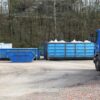Food Waste Reduction Initiatives –
Florida’s grocery stores and supermarkets play a pivotal role in the state’s food industry, serving diverse communities with fresh produce, packaged goods, and more. However, the retail sector also contributes to the significant issue of food waste. As Ready2Go Dumpsters, a leading dumpster rental company in Florida, we recognize the importance of reducing food waste, and in this article, we will explore the initiatives taken by grocery stores and supermarkets in Florida to minimize food waste and their positive impacts on the environment, local communities, and business operations.
The Scale of Food Waste
Food waste is a substantial challenge in the United States, and Florida is no exception. The Environmental Protection Agency (EPA) estimates that around 30-40% of the food supply in the U.S. is wasted each year. In Florida, grocery stores and supermarkets are major contributors to this problem due to factors such as product spoilage, overstocking, and aesthetic standards that lead to the rejection of cosmetically imperfect produce.
The Environmental and Economic Consequences
Food waste has significant environmental and economic consequences. When food waste ends up in landfills, it decomposes and produces methane, a potent greenhouse gas that contributes to climate change. Furthermore, the production and transportation of uneaten food consume valuable resources such as water, land, and energy, which could be used more efficiently to feed the global population. The economic costs of food waste include the expenses related to the purchase, storage, and disposal of food, which directly impact a business’s bottom line.
Food Waste Reduction Initiatives
To address the challenge of food waste, Florida grocery stores and supermarkets are implementing various initiatives aimed at reducing waste and promoting sustainability. These initiatives are diverse and multifaceted, reflecting the commitment of these businesses to environmental responsibility, community engagement, and financial efficiency.
1. Surplus Food Donation Programs: Many grocery stores and supermarkets in Florida have established partnerships with local food banks, shelters, and nonprofit organizations to donate surplus but edible food. By redistributing excess food to those in need, these businesses play a crucial role in combating food insecurity while minimizing waste.
2. Produce Imperfect Programs: Grocery stores in Florida are increasingly adopting “Produce Imperfect” or “Ugly Produce” programs, which involve selling cosmetically imperfect fruits and vegetables at a discounted price. This reduces the rejection of perfectly good produce based on appearance and helps to decrease food waste.
3. Reduced Portion Sizes: Some grocery stores and supermarkets are offering reduced portion sizes, encouraging customers to purchase what they can consume. This not only helps minimize food waste but also gives customers greater flexibility.
4. Food Donation Tracking Apps: Utilizing technology, some businesses have adopted food donation tracking apps that streamline the process of surplus food donation, making it more efficient and accessible for both businesses and recipient organizations.
5. Composting Programs: Grocery stores in Florida are embracing composting as a means to divert organic waste from landfills. This organic waste is then converted into valuable compost material, which can be used in landscaping and agriculture.
6. Inventory Management Systems: Advanced inventory management software and systems help grocery stores monitor stock levels, manage expiration dates, and make informed purchasing decisions, thus reducing over-purchasing and the risk of food spoilage.
7. Data Analytics: Data analytics tools are being used to track food waste trends and patterns. By analyzing data on waste generation, businesses can make data-driven decisions to reduce waste at the source.
8. Public Awareness Campaigns: Many grocery stores are actively engaging in public awareness campaigns. They use in-store signage, brochures, and social media to inform customers about food waste reduction efforts and encourage responsible shopping and consumption.
Case Studies
Let’s take a look at two notable grocery stores in Florida that have successfully implemented food waste reduction initiatives:
1. Publix Super Markets, Inc.: Publix, a major grocery store chain in Florida, has implemented a comprehensive food waste reduction program. It includes surplus food donation to Feeding America and composting organic waste. Publix has also embraced reduced portion sizes and works toward improving inventory management to minimize waste.
2. Whole Foods Market: Whole Foods Market, with several locations in Florida, has introduced a Produce Imperfect program, which offers “ugly” produce at discounted prices. This initiative helps reduce the rejection of cosmetically imperfect fruits and vegetables while offering customers more affordable options.
The Benefits of Food Waste Reduction
The efforts of Florida grocery stores and supermarkets to reduce food waste bring numerous benefits:
– Environmental Impact: Food waste reduction initiatives significantly reduce the environmental impact of waste, including methane emissions from landfills and the depletion of natural resources.
– Community Engagement: Surplus food donation programs engage the community, addressing food insecurity and enhancing the stores’ relationships with local nonprofit organizations.
– Financial Savings: By minimizing food waste and improving inventory management, grocery stores can reduce costs related to waste disposal and over-purchasing.
– Reputation and Customer Loyalty: Embracing food waste reduction initiatives improves a store’s reputation as a socially responsible and sustainable business, attracting eco-conscious customers.
– Legal Compliance: These initiatives help stores comply with legal regulations related to food donation and waste management.
Grocery stores and supermarkets in Florida are at the forefront of food waste reduction efforts. By implementing various initiatives, they contribute to a more sustainable, responsible, and food-conscious state. At Ready2Go Dumpsters, we recognize the importance of supporting these businesses in their food waste reduction journey by providing specialized waste management services. Together, we can continue building a more sustainable Florida that actively minimizes food waste and makes a positive impact on the environment and local communities. Contact us to learn more.






